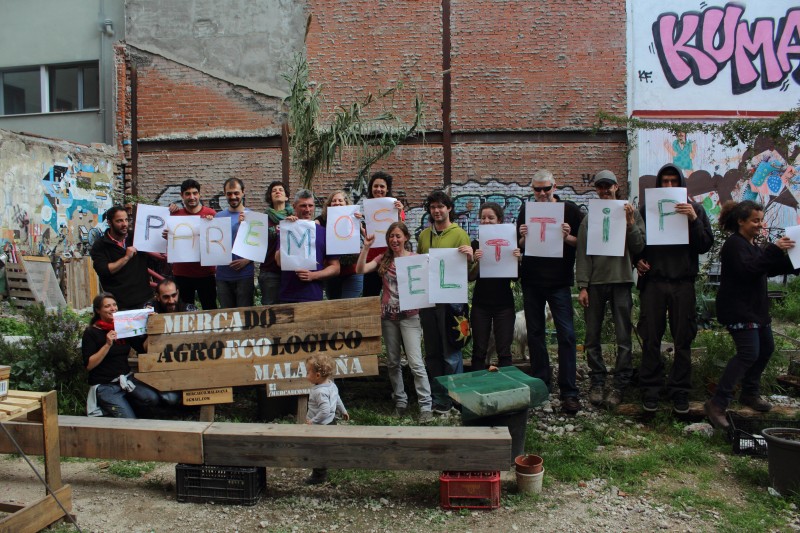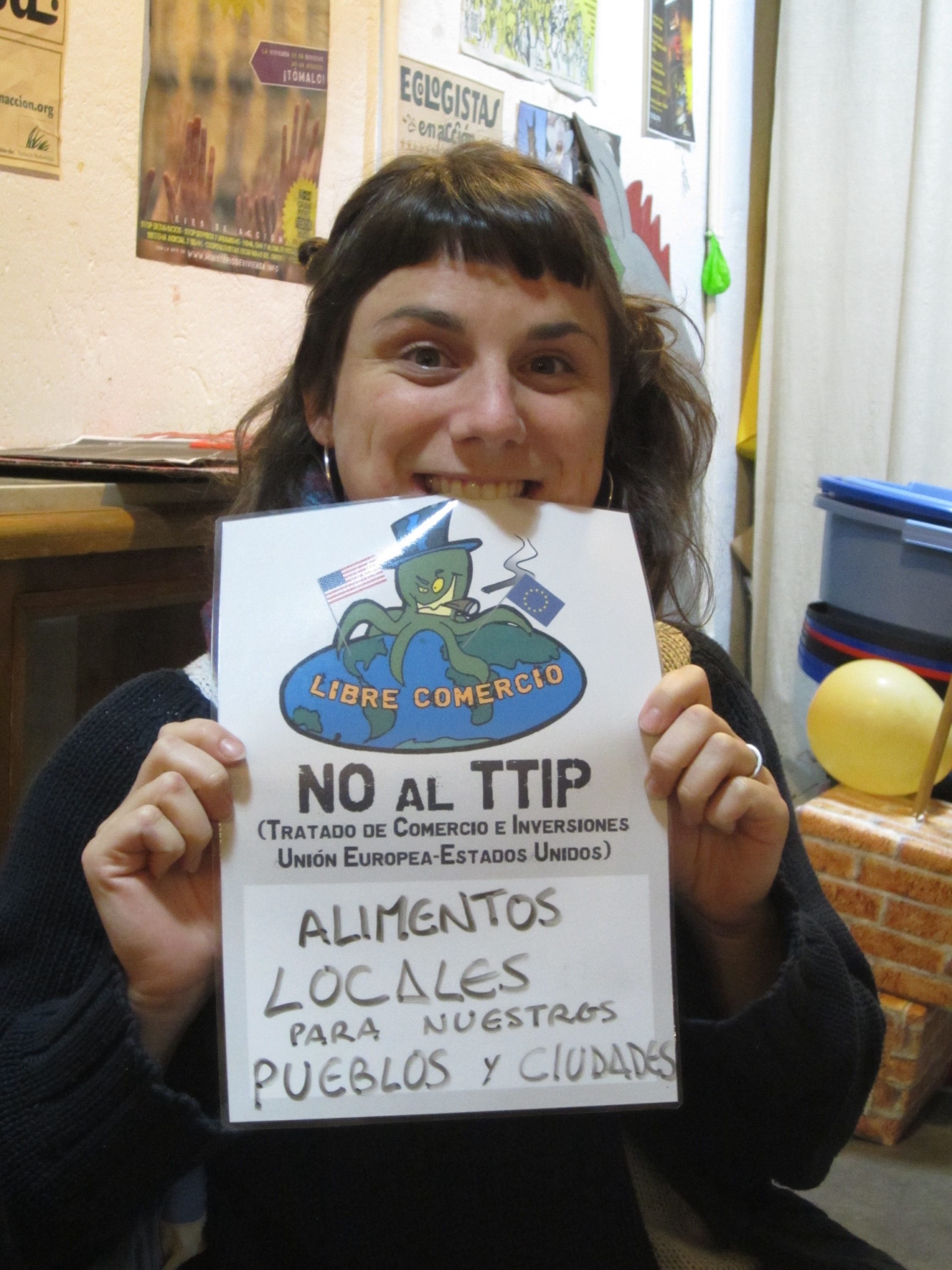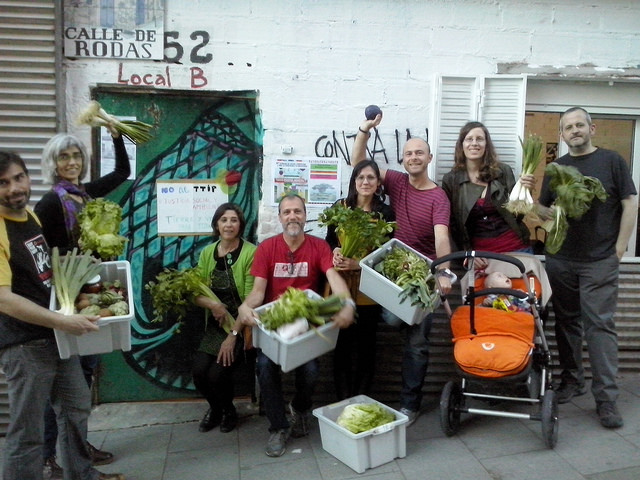
From the Madrid suburb of Malasaña, the community garden is against the TTIP. (CC BY-SA 2.0)
The main concerns for groups that oppose the Transatlantic Trade and Investment Partnership (TTIP) between Europe and North America are the lack of transparency and the way in which the agreement will affect the communities involved.
In Madrid, Spain, the Asamblea Popular de Tres Cantos (Tres Cantos Popular Assembly), a community activist group that is well known for its participation in protests against the economic crisis, is “seeking brave journalists” as part of an appeal to the media to investigate the treaty.
In the video published on the organization's blog and various social networks, members of the assembly appear with photographs of employees from Spain's large media organizations, which have largely ignored the treaty in their coverage, and offer them a challenge:
Officially, the TTIP will facilitate investment and market access to businesses on both sides of the Atlantic, and will have a positive impact on citizens of the European Union and the United States. Nevertheless, the secrecy surrounding the agreement, the absence of public debate, and the emergence of leaked documents are cause for concern among people who fear that the TTIP will mean the loss of national sovereignty to multinational corporations, the deterioration of the environment, the erosion of workers’ and consumers’ rights, and a greater threat to the interests of the public at large.
At the beginning of February, European and American institutions began their eighth round of negotiations on the TTIP. Ever since the groundwork for the treaty was laid in 2012, negotiations have taken place behind closed doors and under pressure from large corporations in the international industrial sector, according to civic organizations and citizens on both sides of the Atlantic.
Political parties, social movements and Spanish associations representing various interests have joined forces to ask for greater transparency in the treaty negotiations by adopting the platform “NO to the TTIP” (#NoalTTIP). One of the online initiatives was a photo protest, which gave rise to the following images from the Cantarranas Agricultural Community Garden:

A placard used for the photography initiative against the TTIP. (CC BY-SA 2.0)

In the streets of Madrid, the garden joins the photography campaign against the TTIP. (CC BY-SA 2.0)
Some independent media outlets in Spain are publishing about the TTIP negotiations and advocating for transparency:
ENTREVISTA | Frédéric Viale, de ATTAC Francia: “El TTIP proviene del deseo de los lobbies, no de los pueblos” http://t.co/keIvvc9qn4
— eldiario.es (@eldiarioes) febrero 22, 2015
INTERVIEW | Frédéric Viale, of ATTAC France: “The TTIP is based on the interests of lobbies, and not on that of the people” http://t.co/keIvvc9qn4
— eldiario.es (@eldiarioes) February 22, 2015
El TTIP o cómo venderle tu alma al diablo https://t.co/Kh9eQFJcfV por @ecanrog #TTIP pic.twitter.com/NM6Nd1EXAq
— Diagonal Periódico (@El_Diagonal) febrero 19, 2015
The TTIP, or “How to Sell Your Soul to the Devil” https://t.co/Kh9eQFJcfV by @ecanrog #TTIP pic.twitter.com/NM6Nd1EXAq
— Diagonal Periódico (@El_Diagonal) February 19th 2015
¿Qué es la convergencia reguladora del #TTIP? Conoce las trampas del tratado http://t.co/uNN5oJYIVa vía @lamarea_com #TTIPSecret #NoalTTIP
— Amigos de la Tierra (@AmigosTierraEsp) febrero 11, 2015
What is the #TTIP‘s “Regulatory Convergence”? Learn about the pitfalls of the treaty http://t.co/uNN5oJYIVa via @lamarea_com #TTIPSecret #NoalTTIP
— Amigos de la Tierra (@AmigosTierraEsp) (Friends of the earth) February 11th, 2015
Meanwhile, the website Economía Ciudadana (Citizen Economy) is attempting to obtain the records of the negotiations with help the of the European ombudsman:
@TeresaRodr_ Registro de la reclamación de Acceso a los Docs del #TTIP por la Defensora del Pueblo Europeo #NoalTTIP http://t.co/aZ4gx7FO8A
— Economia Ciudadana (@citizeneconomy) octubre 21, 2014
@TeresaRodr_ Request for access to #TTIP docs filed with the European Ombudsman #NoalTTIP http://t.co/aZ4gx7FO8A
— Economia Ciudadana (@citizeneconomy) October 21, 2014
It will only be possible to ascertain the true impact of the TTIP when the public is granted access to negotiation records and information about meetings that have taken place between institutions and interest groups, as well as when committed journalists investigate the agreement and civic organizations offer their support. This is why those concerned are calling for more engagement and “brave journalists”.






